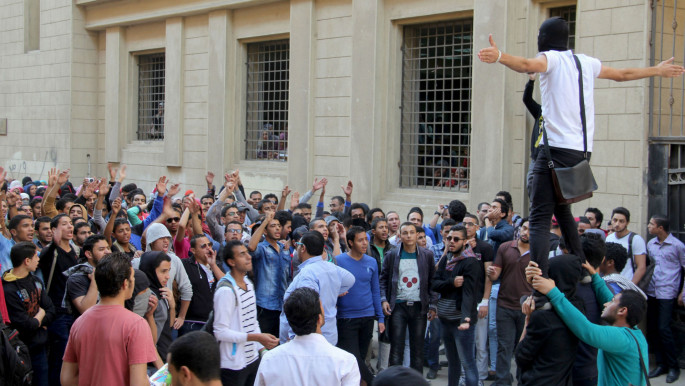Protesters and security personnel killed during Cairo demonstrations
Egyptian security services opened fire on protesters in eastern Cairo killing at three on Friday, while an officer and a soldier have been killed in separate drive-by attacks.
Police and military officers had drastically beefed up their presence in advance of the protests, which were held under the slogan "The Muslim Youth Uprising".
“The number of dead may rise to over ten within hours because of the critical condition of the injured protesters that have been taken to hospital," an eyewitness told al-Araby al-Jadeed's Arabic service reporter in Cairo. Protesters were "shot by security forces as they disperse the hundreds of people taking part in the demonstrations".
The Salafi call
The Salafi Front called the protests against "secular and military" rule with the goal of "declaring the Islamic identity of Eypt and refusing the subordination to Zionism and Western hedgemony and to bring down military rule".
| Security forces used live ammunition and birdshot pellets to disperse protesters. |
Prior to the demonstrations, more than a hundred people were rounded up under the auspices of being members of the blacklisted Muslim Brotherhood movement. Many main roads were blocked and there was a heavy army presence.
The Salafi Front is the largest group from a conservative form of Islam that backs imprisoned former President Mohamed Morsi. It stated that it had instructed its followers to demonstrate peacefully.
Low turnout
Mass protests did not materialise on the scale that was hyped up by much of the media, while localised demonstrations were harshly put down by the security services.
"On the eve of the event there were large internal differences within the upper ranks of the Muslim Brotherhood over whether or not to postpone the demonstrations. This blocked any firm decision being made which in turn led to the low turnout," said Ismail Alexandrani, a Cairo based socio-political researcher and fellow at the Arab Reform Initiative. "There was a generational divide, with the old guard prefering a postponement and the younger members in favour of taking to the streets."
Alexandriani also suggested there was a further division between domestic and diaspora Brotherhood members over the demonstrations.
There has been a surprisingly low amount of social media interaction on the demonstrations. However, photos of protesters shot dead have been circulating.
Matarriya was the only area that saw significant protests while other more localised groupings were quickly dispersed.
"Security forces used live ammunition and birdshot pellets to disperse protesters in Ain Shams, Matarriya and Ezbet al-Nakhl, injuring dozens," an eyewitness told al-Araby al-Jadeed's Arabic service.
| Social media spotlight | |
| #Trending: Young Egyptians calling for 'Muslim Youth Intifada' |
|
| Blog: In a time of hysteria, blame must be shared around |
|
| Analysis: Egypt's day of reckoning? | |
 |
In smaller protests opponents of the 2013 military coup began the first protests, chanting, "God is great" and "We are one hand" in demonstrations in al-Asher in Nasr City.
The protesters condemned the torture they said prisoners were subjected to and what they described as unjust rulings against Egypt’s young people.
Protesters in Giza's Haram district chanted slogans against the crackdowns in universities, and the forced evictions of Sinai residents along the border with Gaza.
At several protest sites, demonstrators burned tires and made human chains in the road to try and fend off the security services' advances.
Security forces closed off areas around Tahrir Square in downtown Cairo, the Ittihadiya presidential palace and the ministry of defence in Kobri al-Qubba, east Cairo.
They also deployed military vehicles and set up reinforced metal barriers with barbed wire in the capital’s main streets.
The pictures of largely peaceful and empty streets were touted in Egyptian media as a victory for the Sisi-led government.
The Revolutionary Socialist Movement has released a statement pinning full responsibility for today's bloodshed on the "leaders of the military coup".
The 6 April opposition movement announced in a press conference on Wednesday that they would not heed the calls to a protest they defined as "sectarian, which will divide the Egyptian people".
"The right to demonstrate should be guaranteed for everyone, as long as it is peaceful," said a spokesman.
Some members of the opposition are claiming that the threat posed by protests was exaggerated by the authorities to distract from tomorrow's court verdict on the retrial of ousted president Hosni Mubarak, former interior minister Habib al-Adly and six former top security officials on charges of ordering the murder of hundreds of protesters during the 2011 uprising.


![President Pezeshkian has denounced Israel's attacks on Lebanon [Getty]](/sites/default/files/styles/image_684x385/public/2173482924.jpeg?h=a5f2f23a&itok=q3evVtko)



 Follow the Middle East's top stories in English at The New Arab on Google News
Follow the Middle East's top stories in English at The New Arab on Google News


